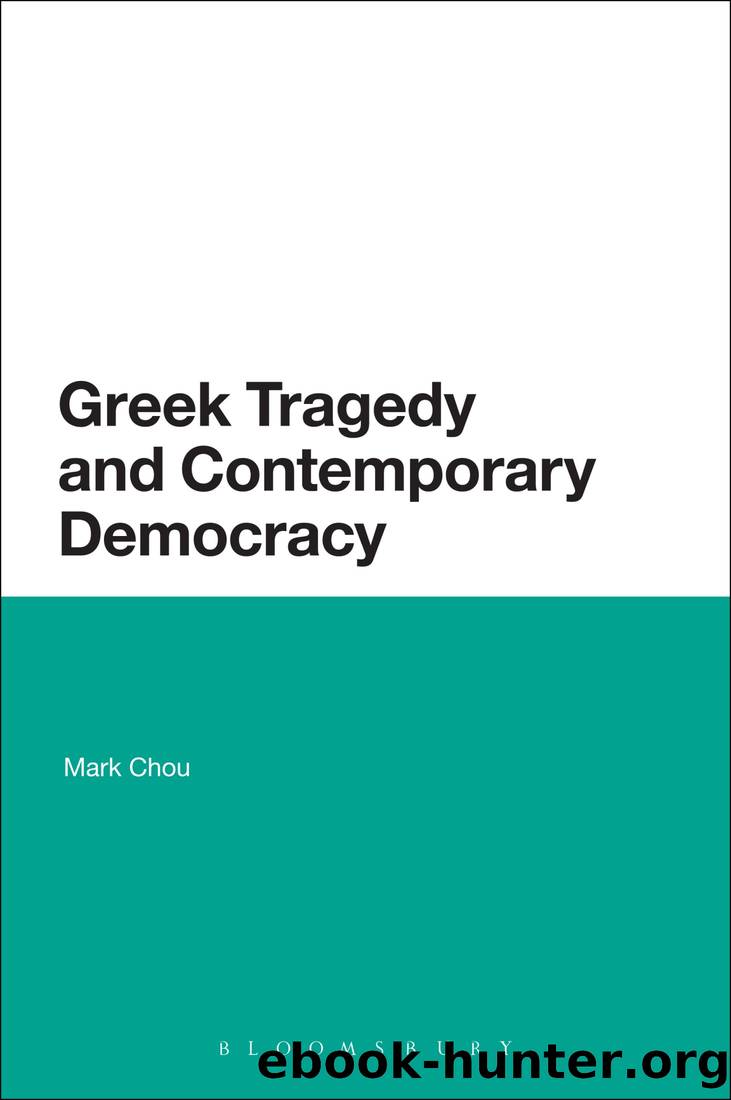Greek Tragedy and Contemporary Democracy by Mark Chou

Author:Mark Chou [Chou, Mark]
Language: eng
Format: epub
Tags: Political Science, Essays, General, History & Theory
ISBN: 9781441190482
Google: 8e7KDwAAQBAJ
Publisher: Bloomsbury
Published: 2012-10-04T21:58:11+00:00
Characters
To make these decisions, Aeschylus populated his tragedy with a cast of characters that would have resounded with a good cross section of his Athenian audiences. Indeed, though not all were liked or familiar figures, they were, according to Mary Ebbottâs classification, âmultidimensional, sublime, profoundly complex whole â all character traits without which no tragic fall could have been possibleâ. And given the varied cast, it also became possible for him to manufacture âzones of interactionâ for characters from different worlds to engage with one another.
But, of the four main characters in Suppliants, it is arguably the group of 50 suppliant women who are the most noteworthy. Because of their number, Aeschylus has made them take the place of the chorus within the tragedy. In itself a unique feature, the chorus of suppliant maidens essentially constitutes the protagonist in Aeschylusâ tragedy, given that more than half of the play is composed of suppliant choral lyric.8 The three remaining characters include Danaus, the suppliantsâ father, Pelasgus, the king of Argos and the Egyptian Herald, who enters late in the tragedy to forcibly seek the return of the suppliants to Egypt.
As women, the suppliantsâ prominence within the tragedy would have been highly significant. For both the Argives within the tragedy and the Athenian audiences who witnessed the performance of it at the City Dionysia, these were not like the typical women they would have confronted in their daily lives. They were impetuous and exotic Egyptian women. Here, the words of Danaus and Pelasgus are a testament to this:
Remember, bend!
You are in want, strangers, fugitives,
and rash tongues do not suit
the part of weakness.9
Where
have you come from? A congregation
glittering, bizarre in alien robes and diadems,
and womanly, yet gaudy as no women
I have ever known or dreamed . . .10
The words of their father and later of the king depict the suppliants as women eccentric in their status and aspiration. Not only that, but they are foreign both in their physical and political constitutions. They dictate the action as public figures, something which no woman of Greece was. Women, in Greek society, were private figures who had no public voice or democratic vote. By contrast, the Egyptian sisters of Aeschylusâ tragedy dominate the dialogue and, before long, turn into Pelasgusâ inquisitor: what cause has he to deny them entry into the city? This is all the more astounding since Pelasgus is the sovereign of the land in which they are seeking asylum. Regardless of their lowly position, these women take charge. They assume the role that is conventionally reserved for the father figure, Danaus. As a result, all he can do is caution his boisterous daughters to âtrust | in the elder wisdom of your captain-fatherâ.11 But, these words have little weight. They are more a plea than a command. From beginning to end, Danaus appears insignificant; a wise sage turned servant. There is little that Aeschylus does with him, at least within this tragedy. For a man of stately prestige, this would indeed have amounted to an inversion of ancient norms.
Download
This site does not store any files on its server. We only index and link to content provided by other sites. Please contact the content providers to delete copyright contents if any and email us, we'll remove relevant links or contents immediately.
| Anarchism | Communism & Socialism |
| Conservatism & Liberalism | Democracy |
| Fascism | Libertarianism |
| Nationalism | Radicalism |
| Utopian |
The Secret History by Donna Tartt(19023)
The Social Justice Warrior Handbook by Lisa De Pasquale(12182)
Thirteen Reasons Why by Jay Asher(8882)
This Is How You Lose Her by Junot Diaz(6869)
Weapons of Math Destruction by Cathy O'Neil(6260)
Zero to One by Peter Thiel(5782)
Beartown by Fredrik Backman(5729)
The Myth of the Strong Leader by Archie Brown(5491)
The Fire Next Time by James Baldwin(5422)
How Democracies Die by Steven Levitsky & Daniel Ziblatt(5209)
Promise Me, Dad by Joe Biden(5139)
Stone's Rules by Roger Stone(5078)
A Higher Loyalty: Truth, Lies, and Leadership by James Comey(4945)
100 Deadly Skills by Clint Emerson(4910)
Rise and Kill First by Ronen Bergman(4772)
Secrecy World by Jake Bernstein(4736)
The David Icke Guide to the Global Conspiracy (and how to end it) by David Icke(4696)
The Farm by Tom Rob Smith(4500)
The Doomsday Machine by Daniel Ellsberg(4480)
